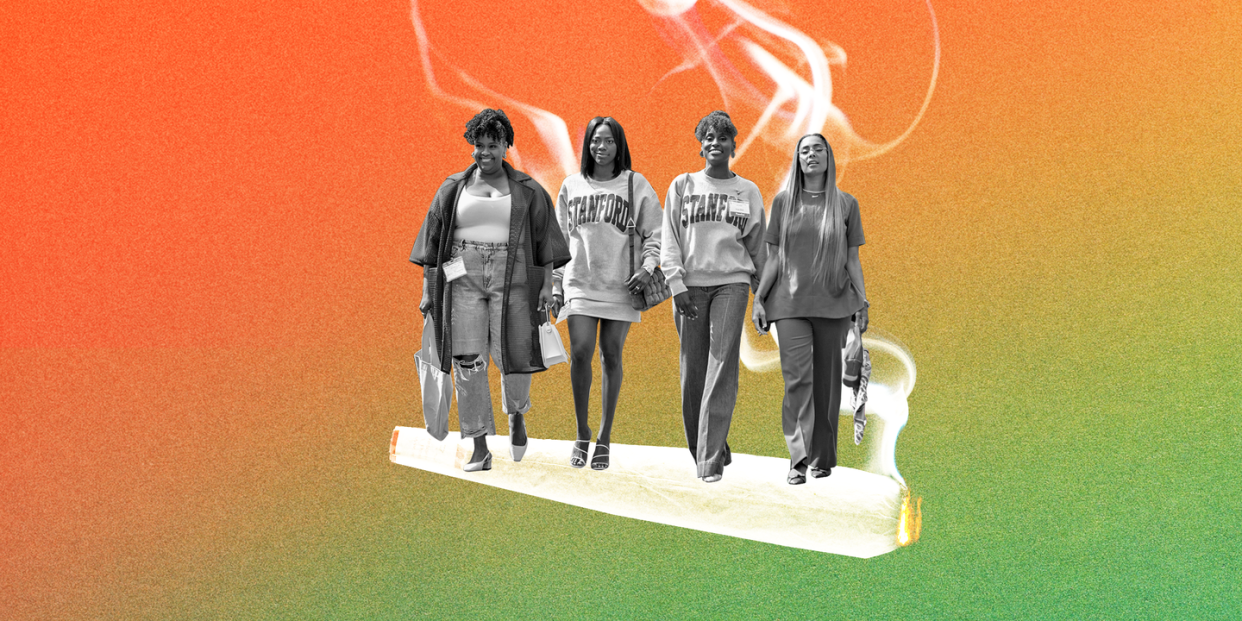Thank You, ‘Insecure,’ for Making Me Feel Seen as a Black Woman Weed-Smoker

There’s a scene in Insecure that will stay with me long past the groundbreaking HBO series’ end this Sunday. In “Chillin’, Okay?!,” the seventh episode of the final season, Molly, Kelly, and Tiffany link up at Issa’s Los Angeles home, where the gracious hostess kicks off their girls’ night with an offering of lovingly—and, admittedly, soggily—hand-rolled joints. “I sooo needed this,” moans Molly. An overachieving, high-performing attorney, her life has recently been upended by a devastating family medical emergency. She shuts her eyes and sniffs the spliff with sweet anticipation. “Well, we got you, because today is all about letting you decompress,” says Issa.
What follows is an evening filled with joy, laughter, compassion, self-reflection, and munchies. At first glance, the scene may seem insignificant. A group of grown women pre-gaming with ganja for a night out. But for me, a 26-year-old Black woman who harbors some shame about using marijuana, watching a group of grown Black women smoke weed for both self-preservation and pleasure was remarkable.
In fact, it was a first.
My relationship with smoking weed began when I had my first panic attack. A college student away from home for the first time, I crumbled beneath the overwhelming weight of adulthood and gasped for air while a million tiny phantom needles pricked my cheeks. A nurse explained what had likely happened and suggested I see a therapist. Therapy did help, but the center was often overbooked. On the weeks I couldn’t land an appointment, I lay in bed for hours, paralyzed by my growing to-do list. I avoided my responsibilities, my hobbies, and my dinners with friends, sinking deeper into a dark, anxious depression fueled by my avoidant behavior.
Then one morning after a twerk-filled night out, I awoke in a friend’s room to an earthy smell. “It’s Self-Care Sunday!” she declared, offering me an elephant-shaped pipe packed with bud. I froze. Up until then, I had associated marijuana with criminals and disaster, and yet here was my well-adjusted friend who challenged those assumptions. So I hit the pipe and braced myself. But instead of falling apart, I felt whole.
Smoking trees seamlessly became a prominent part of my wellness routine. Tackling my to-do list and other routine tasks that typically paralyzed me with anxiety now felt less catastrophic. Smoking also helped me practice more self-compassion. I showed myself patience and forgiveness instead of spiraling downward with negative self-talk. I actually wanted to take care of myself. For the first time in a long time, I was happy to be alive. However, despite my newfound routine, I still couldn’t shake my shame around smoking.
Although I first smoked as a young woman, my relationship with the drug stems back to my childhood. Growing up, I witnessed close relatives go to jail for possession, instilling in me a deep fear of the consequences that come with being Black and having weed. And yes, legalization is thankfully spreading nationwide now; however, Black people are still nearly four times more likely to be arrested for marijuana than white people are, according to a 2020 report by the American Civil Liberties Union.
News of Black women like Whitney Beatty, Ebony Andersen, and Kika Keith blazing uncharted paths in the cannabis industry have only recently been highlighted like never before, yet these stories continue to be outnumbered by sensationalized stories and heartbreaking headlines that underscore the racial and gendered disparities facing Black women who use marijuana. Last year, record-shattering track and field star Sha’Carri Richardson tested positive for cannabis, which she reportedly used to cope with the death of her mother, and was unfairly suspended from the 2020 Summer Olympics. After 28-year-old Sandra Bland unexpectedly died in a Texas jail in 2015, reports of THC discovered in her toxicology report were used to smear her character.
Compare all those receipts to the fact that for years, men have dominated the stoner narrative with cult classics—think: How High, Half Baked, Pineapple Express, Harold and Kumar Go to White Castle, and Friday, to name a few. A refreshing change came in 2014 with Broad City, a Comedy Central series following the adventurous lifestyles of two young white women who, like me, were figuring out life while exploring their identities in New York City. They dealt with relationship and roomie drama, kept positive dispositions, cracking jokes, and got high. But I still longed to see Black women toking on TV.
So thank you, Insecure, for showing a practice I’ve done in secret for so long portrayed in a regular-degular way. That special scene spotlighted just four of the many faces of Black women weed-smokers, depicting cannabis as a component not only of celebratory experiences but of wellness routines too. Those 10 or so minutes helped me to dispel some of the shame I’ve been holding for all these years. For many people, smoking marijuana is self-care, and that includes Black women. Our stories deserve attention too, and there are still so many left to tell.
You Might Also Like

